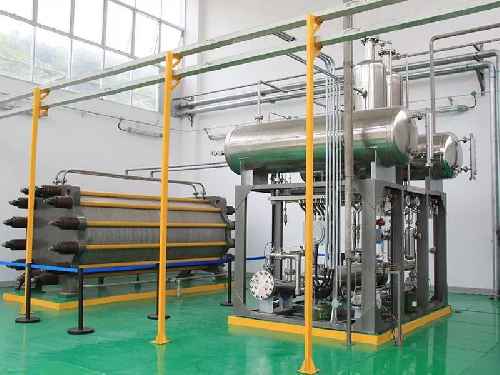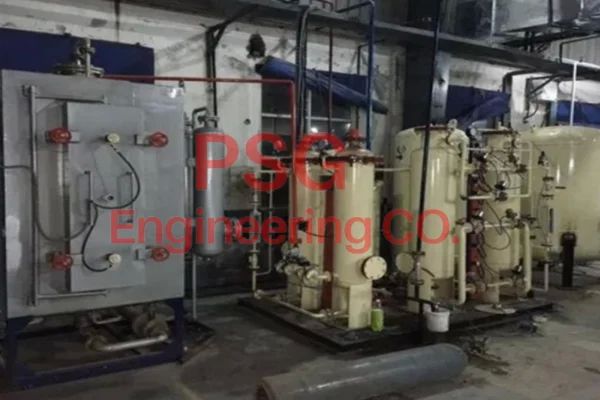- Swarg Ashram Road, Hapur, Uttar Pradesh
- GST NO. : 09DFIPS9046Q1Z9
- +91-9899123075, +91-8126173604
Hydrogen Gas Plant
Leading Manufacturers, Exporters and Wholesaler of Electrolysis Based Hydrogen Gas Plant and Semi Automatic PSA Hydrogen Gas Plant from Hapur.
| Business Type | Manufacturer, Exporter, Supplier |
| Technique | Electrolytic Processes |
| Automatic Grade | Semi Automatic |
| Dew Point | ≤ -70 Degree C |
| Power Source | Electric |
| Application | Power Industry Generate Electricity,Hydrogen Generation |
| Feature | High Efficiency Durability |
| Temperature | 75 Degree C To 85 Degree C |
| Purity | 98% |
| Quality | Good Quality |
| Brand Name | PSG Engineering |
Preferred Buyer From
| Location | Worldwide |
This technique utilizes Electrolysis (bipolar variety) in conjunction with gas boosters and de-oxo units to produce hydrogen. Electrolysis separates the components of water (oxygen and hydrogen) by passing an electrical current through it.
The hydrogen is then collected in a hydrogen gas holder and utilized for further processing. While the hydrogen obtained through electrolysis is already 99.8% pure, the use of de-oxo units ensures even greater purification (up to 99.999%).
In an electrolyzer, a symmetrical conductive structure is employed, with the anode in the center and the cathode at the ends, preventing voltage shortage. Even though the hydrogen obtained through electrolysis is already 99.8% pure, the inclusion of de-oxo units aids in its further purification (up to 99.999%). The purified gas obtained from this process is utilized in heat treatment furnaces, such as annealing, and sintering, and as a reducing atmosphere in furnaces.
PSG Engineering Company, located in Hapur, Ghaziabad, Uttar Pradesh, is a leading manufacturer, supplier, and exporter of hydrogen generation plants using electrolysis technology. With a strong commitment to innovation and quality, PSG Engineering specializes in the design and production of advanced electrolysis systems that efficiently produce high-purity hydrogen. These systems are ideal for various industrial applications, including chemical manufacturing, power generation, and fuel cell technology.
PSG Engineering Company’s state-of-the-art facilities and skilled workforce ensure that each hydrogen generation plant is built to the highest standards of reliability and performance. The company’s electrolysis systems are designed to be energy-efficient and environmentally friendly, providing a sustainable solution for hydrogen production.
As an exporter, PSG Engineering Company has established a global presence, delivering cutting-edge hydrogen generation solutions to clients around the world. Their comprehensive customer support and after-sales service ensure optimal operation and longevity of the equipment. PSG Engineering Company stands out for its dedication to excellence and its role in advancing the hydrogen economy, making it a trusted partner in the field of hydrogen generation.
| Business Type | Manufacturer, Exporter, Supplier |
| Country of Origin | India |
| Capacity | 1Nm3/hr to 200Nm3/hr |
| Purity | 100 PPM to 1-PPM un-cracked Ammonia |
| Pressure | Up to0.5- 6 Bar without Booster compressor |
| Dew Point | Up to (-) 80 Degree C |
| Brand Name | PSG Engineering |
Preferred Buyer From
| Location | Worldwide |
Salient Features:
- Low Capital cost
- Virtually maintenance free
- Low running cost
- Available in capacities
- 2NH3 = 3H2 + N2
Catalytic decomposition:
- Ammonia is fed into the cracker unit and heated at high temperatures (usually around 850-950°C) in the presence of a suitable catalyst (often nickel-based). This process breaks down ammonia into its component gases:
- Hydrogen (H2): The most sought-after product in this process.
- Nitrogen (N2): The other main product formed during decomposition.
Separation and Purification:
- After decomposition, the mixture of hydrogen and nitrogen gases is separated. This separation is usually achieved through processes such as pressure swing adsorption (PSA) or membrane separation.
- PSA Technology: PSA is commonly used to purify and separate hydrogen gas from nitrogen and other gases. It works on the principle of selective adsorption of gases on an adsorbent material under pressure.
Hydrogen Gas Production:
The pure hydrogen gas obtained from a cracker plant is usually of high purity (often 99% or more). This high purity hydrogen is suitable for various industrial applications where clean and reliable hydrogen supply is required.
Applications of Hydrogen Gas from Ammonia Cracker Plant:
- Chemical Industry: Used as feedstock for various chemical processes including hydrogenation reactions.
- Metallurgical Processes: Used for hydrogenation and reduction processes in metal refining.
- Electronics: Used in the semiconductor industry and as a carrier gas in gas chromatography.
- Energy Applications: Used in fuel cells to generate electricity and in the hydrogenation of oils in the food industry.
Key Features of Sami Automated PSA Hydrogen Gas Plants:
- Automation: These plants are designed for automated operation, ensuring efficient and continuous production of hydrogen gas.
- PSA Technology: Uses Pressure Swing Adsorption technology for purification and separation of hydrogen from other gases.
- Capacity: Can vary from small-scale units to large industrial plants, depending on production requirements.
- Safety: Includes safety features for handling hydrogen gas, which is flammable and needs careful handling.
Environmental Considerations:
Energy Efficiency: Focuses on optimizing energy consumption during ammoniacracking and hydrogen purification processes.


